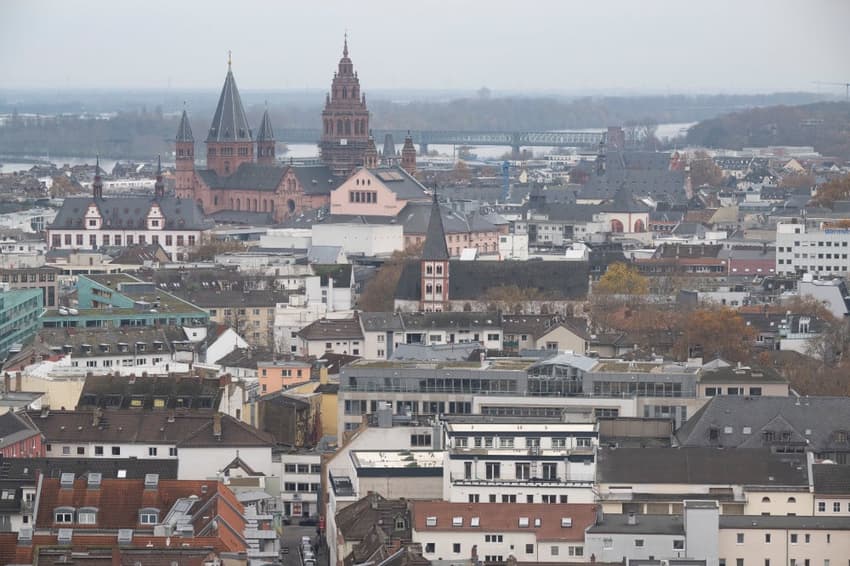Why property prices are falling in almost all German cities

Last year, prices for residential property were cheaper than in the previous year in around 96 percent of all regions in Germany, according to the newly published Housing Atlas.
Prices fell by 10 percent after adjusting for inflation - particularly sharply in Stuttgart and Mainz - according to the annual report published by Postbank together with the Hamburg Institute of International Economics (HWWI).
The downward trend in property prices in Germany spiked in 2023 and also spread to rural areas, where they had previously remained stable.
Why are property prices falling?
Property prices have been falling since 2022 due to recession, a significant rise in mortgage interest rates, global uncertainties and a slight decline in demand for residential property, according to Postbank.
Prices fell particularly sharply in 2023 in the "Big 7", Germany's seven largest metropolises. Stuttgart recorded the biggest drop in flat prices, which fell by around 16 percent, more than in Munich, Hamburg or Frankfurt.
READ ALSO: Germany sees record drop in property prices

A view of Stuttgart and its surroundings. Photo by Jan Böttinger on Unsplash
Prices also declined by a similar amount in the surrounding areas and in the Rems-Murr district. Catch-up effects in smaller cities surrounding big cities was also evident: of the cities surrounding the Big 7, prices have fallen the most in Mainz, also by around 16 percent.
The downward trend has affected almost all of Germany, with the analysis only finding a real price increase in 16 regions, including the districts of Birkenfeld and Kusel in Rhineland-Palatinate.
READ ALSO: EXPLAINED: When (and how) you can back out of a property purchase in Germany
Where are the most expensive places to live in Germany?
Bavaria's state capital of Munich remains the most expensive place to buy a home in the Bundesrepublik. Last year, there was no other place in Germany where buyers had to pay more per square metre: €8,910 on average.
The second most expensive metropolis within the Big 7 was Hamburg with an average of €6,230, ahead of Frankfurt am Main with €6,180 per square metre. Stuttgart is in 6th place with a price per square metre of €4,870.
"As we are only assuming a dip in prices followed by higher purchase prices for residential property, it may be worth investing now," said Manuel Beermann, Head of Real Estate Product Management at the retail bank in Germany, told German broadcaster SWR.
"Whether financing a property actually pays off depends on the financial strength of the buyer and the location of the property in each individual case."
Sharpest drop in over 60 years
According to another study published in February, prices for German residential real estate fell more sharply in 2023 than they have in at least 60 years.
The price of condominiums fell by 8.9 percent, single-family homes by 11.3 percent and apartment buildings by 20.1 percent, according to the Kiel Institute for the World Economy (IfW) on Thursday.
"The speed and extent of the current fall in real estate prices in Germany are historically unprecedented," the report stated. "Never before since the expert committees began collecting purchase prices in the 1960s have property prices fallen so quickly."
READ ALSO: EXPLAINED: What you need to know about buying property in Germany
However, the recent dip in prices was preceded by a price rally, or a sustained period of increase, which was also unparalleled in historical terms and began around 2009. Since then, prices have risen three to fourfold, depending on the real estate segment, before an abrupt market crash began in 2022.
"In light of the exorbitant rise in prices for over ten years and a new interest rate environment, a phase of price correction is entirely appropriate and is not a cause for concern for the economy as a whole, even at the current level," said IfW President Moritz Schularick.
Comments
See Also
Prices fell by 10 percent after adjusting for inflation - particularly sharply in Stuttgart and Mainz - according to the annual report published by Postbank together with the Hamburg Institute of International Economics (HWWI).
The downward trend in property prices in Germany spiked in 2023 and also spread to rural areas, where they had previously remained stable.
Why are property prices falling?
Property prices have been falling since 2022 due to recession, a significant rise in mortgage interest rates, global uncertainties and a slight decline in demand for residential property, according to Postbank.
Prices fell particularly sharply in 2023 in the "Big 7", Germany's seven largest metropolises. Stuttgart recorded the biggest drop in flat prices, which fell by around 16 percent, more than in Munich, Hamburg or Frankfurt.
READ ALSO: Germany sees record drop in property prices

Prices also declined by a similar amount in the surrounding areas and in the Rems-Murr district. Catch-up effects in smaller cities surrounding big cities was also evident: of the cities surrounding the Big 7, prices have fallen the most in Mainz, also by around 16 percent.
The downward trend has affected almost all of Germany, with the analysis only finding a real price increase in 16 regions, including the districts of Birkenfeld and Kusel in Rhineland-Palatinate.
READ ALSO: EXPLAINED: When (and how) you can back out of a property purchase in Germany
Where are the most expensive places to live in Germany?
Bavaria's state capital of Munich remains the most expensive place to buy a home in the Bundesrepublik. Last year, there was no other place in Germany where buyers had to pay more per square metre: €8,910 on average.
The second most expensive metropolis within the Big 7 was Hamburg with an average of €6,230, ahead of Frankfurt am Main with €6,180 per square metre. Stuttgart is in 6th place with a price per square metre of €4,870.
"As we are only assuming a dip in prices followed by higher purchase prices for residential property, it may be worth investing now," said Manuel Beermann, Head of Real Estate Product Management at the retail bank in Germany, told German broadcaster SWR.
"Whether financing a property actually pays off depends on the financial strength of the buyer and the location of the property in each individual case."
Sharpest drop in over 60 years
According to another study published in February, prices for German residential real estate fell more sharply in 2023 than they have in at least 60 years.
The price of condominiums fell by 8.9 percent, single-family homes by 11.3 percent and apartment buildings by 20.1 percent, according to the Kiel Institute for the World Economy (IfW) on Thursday.
"The speed and extent of the current fall in real estate prices in Germany are historically unprecedented," the report stated. "Never before since the expert committees began collecting purchase prices in the 1960s have property prices fallen so quickly."
READ ALSO: EXPLAINED: What you need to know about buying property in Germany
However, the recent dip in prices was preceded by a price rally, or a sustained period of increase, which was also unparalleled in historical terms and began around 2009. Since then, prices have risen three to fourfold, depending on the real estate segment, before an abrupt market crash began in 2022.
"In light of the exorbitant rise in prices for over ten years and a new interest rate environment, a phase of price correction is entirely appropriate and is not a cause for concern for the economy as a whole, even at the current level," said IfW President Moritz Schularick.
Join the conversation in our comments section below. Share your own views and experience and if you have a question or suggestion for our journalists then email us at [email protected].
Please keep comments civil, constructive and on topic – and make sure to read our terms of use before getting involved.
Please log in here to leave a comment.